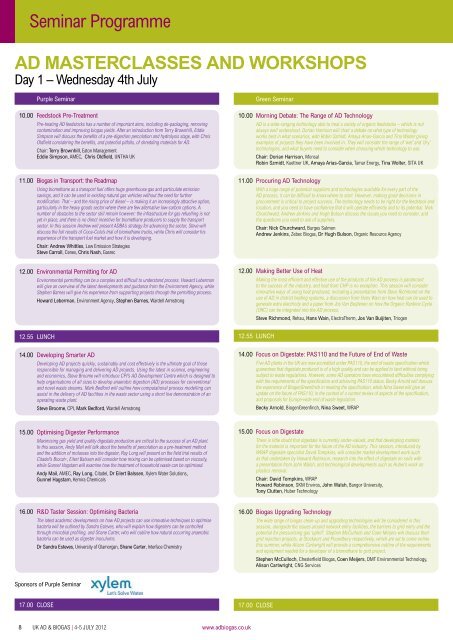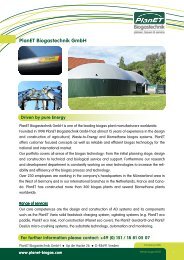AD: YOUR MISSING LINK - ADBA
AD: YOUR MISSING LINK - ADBA
AD: YOUR MISSING LINK - ADBA
Create successful ePaper yourself
Turn your PDF publications into a flip-book with our unique Google optimized e-Paper software.
Seminar Programme<br />
<strong>AD</strong> MAstErcLAssEs AnD WorksHops<br />
Day 1 – Wednesday 4th July<br />
Purple Seminar<br />
10.00 Feedstock Pre-Treatment<br />
Pre-treating <strong>AD</strong> feedstocks has a number of important aims, including de-packaging, removing<br />
contamination and improving biogas yields. After an introduction from Terry Brownhill, Eddie<br />
simpson will discuss the benefits of a pre-digestion percolation and hydrolysis stage, with Chris<br />
oldfield considering the benefits, and potential pitfalls, of shredding materials for <strong>AD</strong>.<br />
Chair: Terry Brownhill, Eaton Management<br />
Eddie Simpson, AMEC, Chris Oldfield, UNTHA UK<br />
11.00 Biogas in Transport: the Roadmap<br />
Using biomethane as a transport fuel offers huge greenhouse gas and particulate emission<br />
savings, and it can be used in existing natural gas vehicles without the need for further<br />
modification. That – and the rising price of diesel – is making it an increasingly attractive option,<br />
particularly in the heavy goods sector where there are few alternative low-carbon options. A<br />
number of obstacles to the sector still remain however: the infrastructure for gas refuelling is not<br />
yet in place, and there is no direct incentive for biomethane producers to supply the transport<br />
sector. in this session Andrew will present <strong>AD</strong>BA’s strategy for advancing the sector, steve will<br />
discuss the full results of Coca-Cola’s trial of biomethane trucks, while Chris will consider his<br />
experience of the transport fuel market and how it is developing.<br />
Chair: Andrew Whittles, low Emission strategies<br />
Steve Carroll, Cenex, Chris Nash, gasrec<br />
12.00 Environmental Permitting for <strong>AD</strong><br />
Environmental permitting can be a complex and difficult to understand process. Howard leberman<br />
will give an overview of the latest developments and guidance from the Environment Agency, while<br />
stephen Barnes will give his experience from supporting projects through the permitting process.<br />
Howard Leberman, Environment Agency, Stephen Barnes, Wardell Armstrong<br />
12.55 LUNCH<br />
14.00 Developing Smarter <strong>AD</strong><br />
Developing <strong>AD</strong> projects quickly, sustainably and cost effectively is the ultimate goal of those<br />
responsible for managing and delivering <strong>AD</strong> projects. Using the latest in science, engineering<br />
and economics, steve Broome will introduce CPi’s <strong>AD</strong> Development Centre which is designed to<br />
help organisations of all sizes to develop anaerobic digestion (<strong>AD</strong>) processes for conventional<br />
and novel waste streams. Mark Bedford will outline how computational process modelling can<br />
assist in the delivery of <strong>AD</strong> facilities in the waste sector using a short live demonstration of an<br />
operating waste plant.<br />
Steve Broome, CPi, Mark Bedford, Wardell Armstrong<br />
15.00 Optimising Digester Performance<br />
Maximising gas yield and quality digestate production are critical to the success of an <strong>AD</strong> plant.<br />
in this session, Andy Mail will talk about the benefits of percolation as a pre-treatment method<br />
and the addition of molasses into the digester, Ray long will present on the field trial results of<br />
Citadel’s Biocat+, Eilert Balssen will consider how mixing can be optimised based on viscosity,<br />
while gunnel Hagstam will examine how the treatment of household waste can be optimised.<br />
Andy Mail, AMEC, Ray Long, Citadel, Dr Eilert Balssen, Xylem Water solutions,<br />
Gunnel Hagstam, Kemira Chemicals<br />
16.00 R&D Taster Session: Optimising Bacteria<br />
The latest academic developments on how <strong>AD</strong> projects can use innovative techniques to optimise<br />
bacteria will be outlined by sandra Esteves, who will explain how digesters can be controlled<br />
through microbial profiling, and shane Carter, who will outline how natural occurring anaerobic<br />
bacteria can be used as digester inoculums.<br />
Dr Sandra Esteves, University of glamorgan, Shane Carter, interface Chemistry<br />
Sponsors of Purple Seminar<br />
17.00 CLOSE<br />
8 UK <strong>AD</strong> & BiogAs | 4-5 JUly 2012<br />
www.adbiogas.co.uk<br />
Green Seminar<br />
10.00 Morning Debate: The Range of <strong>AD</strong> Technology<br />
<strong>AD</strong> is a wide-ranging technology able to treat a variety of organic feedstocks – which is not<br />
always well understood. Dorian Harrison will chair a debate on what type of technology<br />
works best in what scenarios, with Robin szmidt, Amaya Arias-garcia and Tina Wolter giving<br />
examples of projects they have been involved in. They will consider the range of ‘wet’ and ‘dry’<br />
technologies, and what buyers need to consider when choosing which technology to use.<br />
Chair: Dorian Harrison, Monsal<br />
Robin Szmidt, Kuettner UK, Amaya Arias-Garcia, Tamar Energy, Tina Wolter, siTA UK<br />
11.00 Procuring <strong>AD</strong> Technology<br />
With a huge range of potential suppliers and technologies available for every part of the<br />
<strong>AD</strong> process, it can be difficult to know where to start. However, making good decisions in<br />
procurement is critical to project success. The technology needs to be right for the feedstock and<br />
location, and you need to have confidence that it will operate efficiently and to its potential. Nick<br />
Churchward, Andrew Jenkins and Hugh Bulson discuss the issues you need to consider, and<br />
the questions you need to ask of suppliers.<br />
Chair: Nick Churchward, Burges salmon<br />
Andrew Jenkins, Zebec Biogas, Dr Hugh Bulson, organic Resource Agency<br />
12.00 Making Better Use of Heat<br />
Making the most efficient and effective use of the products of the <strong>AD</strong> process is paramount<br />
to the success of the industry, and heat from CHP is no exception. This session will consider<br />
innovative ways of using heat produced, including a presentation from steve Richmond on the<br />
use of <strong>AD</strong> in district heating systems, a discussion from Hans Wain on how heat can be used to<br />
generate extra electricity and a paper from Jos Van Buijtenen on how the organic Rankine Cycle<br />
(oRC) can be integrated into the <strong>AD</strong> process.<br />
Steve Richmond, Rehau, Hans Wain, ElectraTherm, Jos Van Buijiten, Triogen<br />
12.55 LUNCH<br />
14.00 Focus on Digestate: PAS110 and the Future of End of Waste<br />
Five <strong>AD</strong> plants in the UK are now accredited under PAs110, the end of waste specification which<br />
guarantees that digestate produced is of a high quality and can be applied to land without being<br />
subject to waste regulations. However, some <strong>AD</strong> operators have encountered difficulties complying<br />
with the requirements of the specification and achieving PAs110 status. Becky Arnold will discuss<br />
the experience of Biogengreenfinch in meeting the specification, while Nina sweet will give an<br />
update on the future of PAs110, in the context of a current review of aspects of the specification,<br />
and proposals for Europe-wide end of waste legislation.<br />
Becky Arnold, Biogengreenfinch, Nina Sweet, WRAP<br />
15.00 Focus on Digestate<br />
There is little doubt that digestate is currently under-valued, and that developing markets<br />
for the material is important for the future of the <strong>AD</strong> industry. This session, introduced by<br />
WRAP digestate specialist David Tompkins, will consider market development work such<br />
as that undertaken by Howard Robinson, research into the effect of digestate on soils with<br />
a presentation from John Walsh, and technological developments such as Huber’s work on<br />
plastics removal.<br />
Chair: David Tompkins, WRAP<br />
Howard Robinson, sKM Enviros, John Walsh, Bangor University,<br />
Tony Clutten, Huber Technology<br />
16.00 Biogas Upgrading Technology<br />
The wide range of biogas clean-up and upgrading technologies will be considered in this<br />
session, alongside the issues around network entry facilities, the barriers to grid entry and the<br />
potential for pressurising gas ‘uphill’. stephen McCulloch and Coen Meijers will discuss their<br />
grid injection projects, at stockport and Poundbury respectively, which are set to come online<br />
this summer, while Alison Cartwright will provide a comprehensive outline of the requirements<br />
and equipment needed for a developer of a biomethane to grid project.<br />
Stephen McCulloch, Chesterfield Biogas, Coen Meijers, DMT Environmental Technology,<br />
Alison Cartwright, CNg services<br />
17.00 CLOSE



